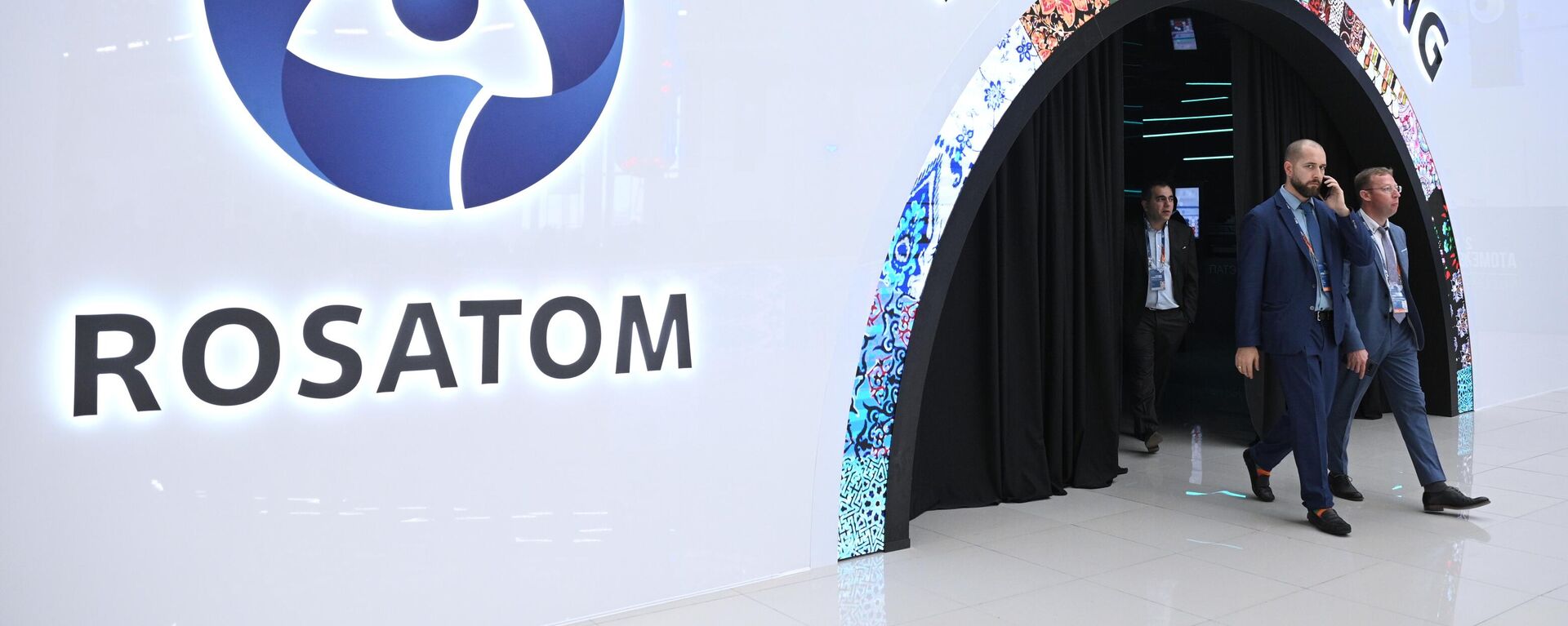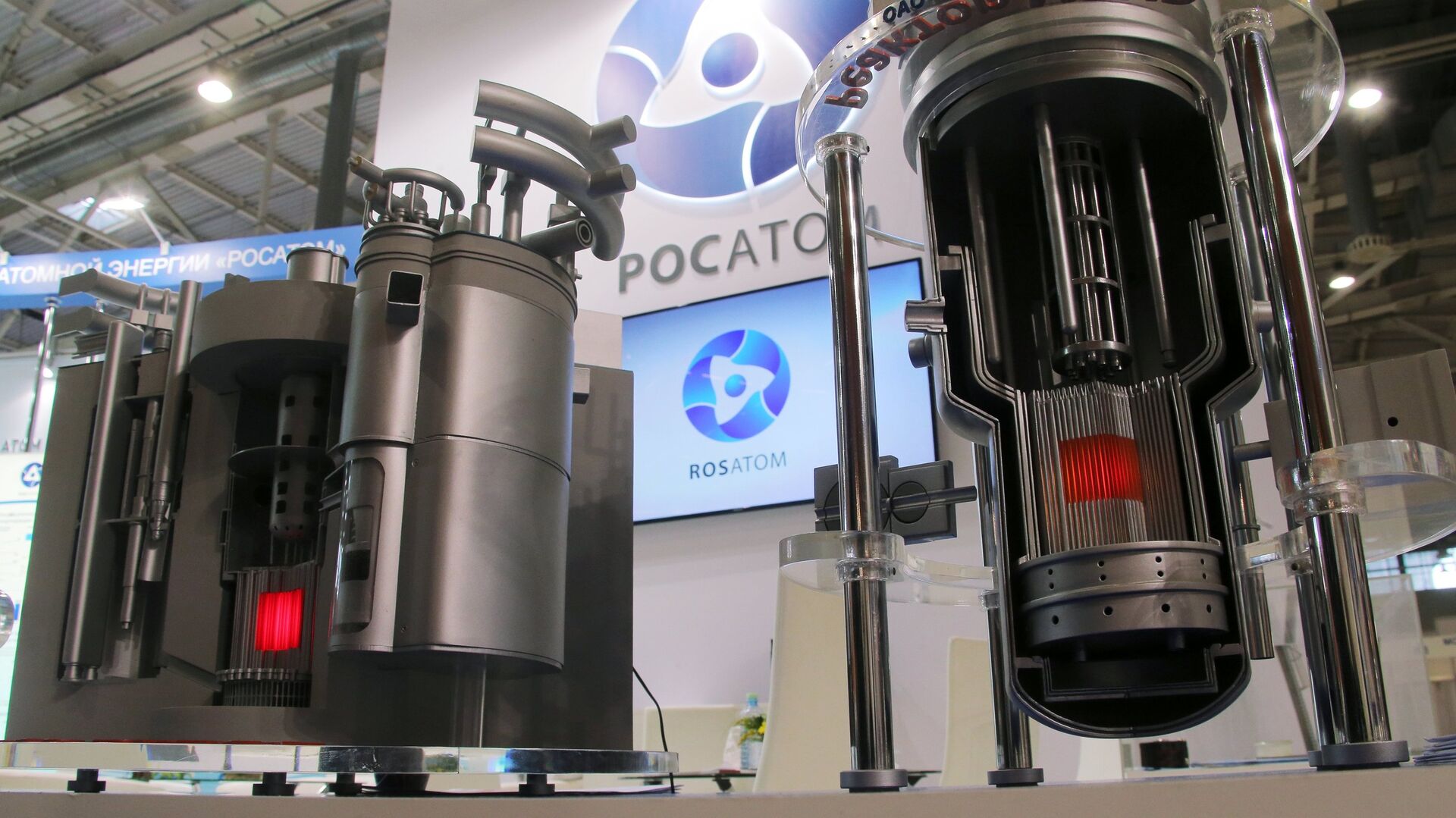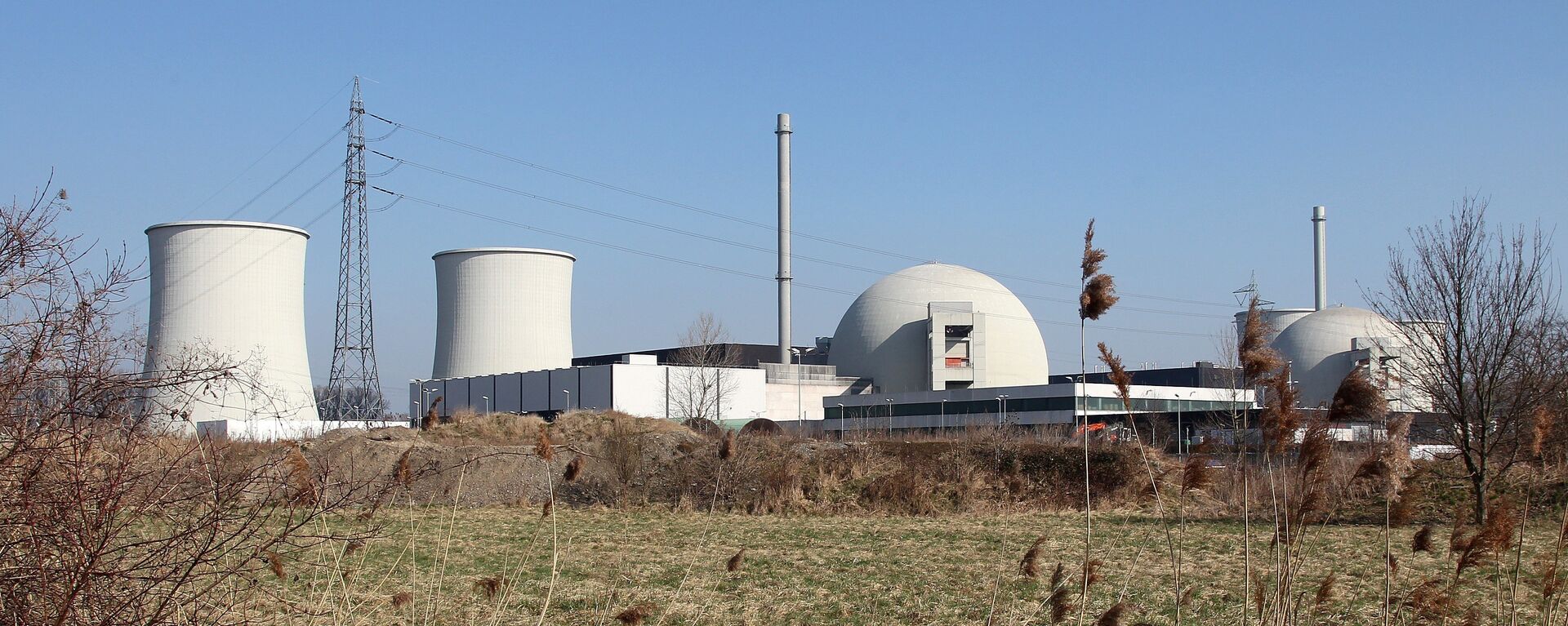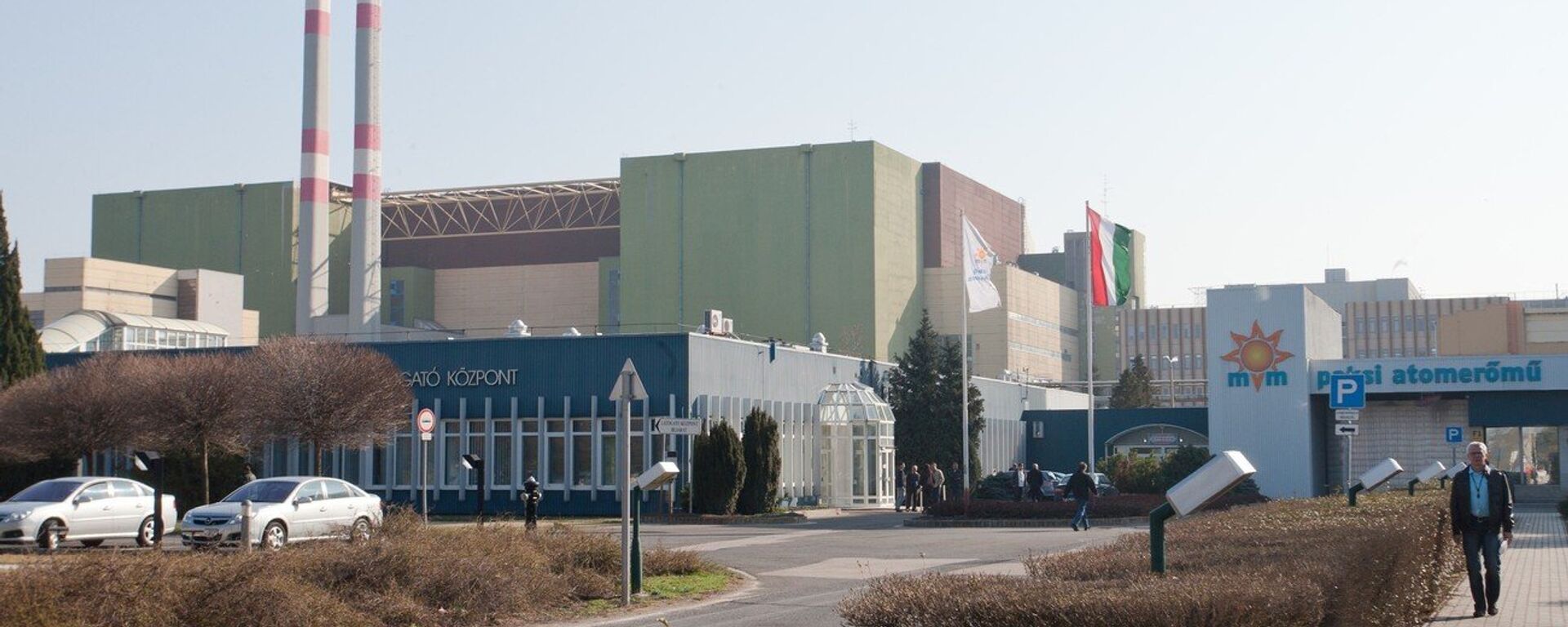https://sputnikglobe.com/20230418/europe-ditching-russias-nuclear-fuel-will-come-at-high-price-1109631547.html
Europe Ditching Russia's Nuclear Fuel Will Come at High Price
Europe Ditching Russia's Nuclear Fuel Will Come at High Price
Sputnik International
The UK, US, Canada, Japan and France on April 16 struck an agreement at the Nuclear Energy Forum at the G7 in Sapporo to expel Russia out of the international nuclear fuel market.
2023-04-18T17:03+0000
2023-04-18T17:03+0000
2023-07-31T16:59+0000
analysis
opinion
europe
us
g7
nuclear
nuclear power
nuclear fuel
russia
sanctions
https://cdn1.img.sputnikglobe.com/img/102416/46/1024164638_0:161:3071:1888_1920x0_80_0_0_574fbb37fb12ca39917f726fb6fd6667.jpg
"European countries, as well as the United States, will reduce the import of enriched uranium from Russia. That is, they will simply gradually abandon it," said Leonid Khazanov. "However, the situation is very ambiguous because, on the one hand, Russia's share in world uranium production does not exceed 10%, but when it comes to uranium enrichment [its share is] about 50%. Unenriched uranium is simply mined uranium. But if you put it in the reactor, the reaction will not go, because there are impurities that interfere [in the process]. Thus, it is necessary to purify uranium from these impurities and obtain uranium-235."'Habit Europe Just Can’t Break'On April 16, five countries of the Group of Seven, namely, the UK, US, Canada, Japan and France, pledged to squeeze Russia from the nuclear fuel market "as quickly as possible" in order to deal a blow to the country's economy and "fundamentally leave Russia out in the cold" amid its special military operation to demilitarize and de-Nazify Ukraine.Earlier this year, Western mainstream press fretted over the Old Continent's unwillingness to slap restrictions on Russia's nuclear industry even though the EU earlier moved to phase out and completely ban the country's other energy commodities such as oil, petroleum products, gas and coal. The media dubbed the EU-Russia nuclear cooperation "the habit Europe just can’t break."As per the EU’s Euratom Supply Agency (ESA), Russia's Rosatom nuclear corporation in 2021 supplied the bloc's reactors with 20% of their natural uranium and provided the EU with 31% of their uranium enrichment services.Furthermore, some European countries have continued to deepen their cooperation with Rosatom over the past year despite the Western sanctions spree. For instance, a new Mochovce-3 Soviet VVER-design reactor came online in Slovakia earlier this year. In addition, TVEL Fuel Company of Rosatom and the Slovak power generation company Slovenské elektrárne a.s. signed a contract for the supply of nuclear fuel to nuclear power plants in Slovakia for 2022-2026 with the possibility of a contract extension to 2030.In August 2022, Hungary issued an authorization to Rosatom to construct two new nuclear reactors in the country. The nation's Paks nuclear power plant operates four Russian-built VVER 440 reactors and receives specific nuclear fuel from Russia. All in all, there are around 18 Russian reactors in Europe.One Doesn't Simply Abandon Russia's Nuclear FuelIt's obvious that Washington is behind the initiative to ban Russia's nuclear fuel, according to the energy expert. Previously, the US twisted the EU hand into abandoning Russia's fossil fuels and replacing Russian natural gas with American LNG. The US has exerted persistent pressure on smaller states of Eastern and Central Europe who receive financial support from Brussels, Khazanov noted, adding that some of them are being threatened of being deprived of funding. In May 2022, Finland rejected a plan to build a Russian nuclear power plant in the Nordic country. However, it's not so easy to ditch Russian nuclear fuel when it comes to existing atomic stations driven by Russia-made reactors.The Western mainstream press has placed emphasis on renewables, claiming that they could partially substitute Russia's energy deliveries. However, according to Khazanov, this won't work."If we are talking about Europe, neither solar nor wind power plants will completely replace traditional [means of] generation there, including nuclear ones," argued Khazanov. "It is necessary to allocate space for these [wind and solar] stations, even if wind farms can still stand on the seabed. For the rest, you have to buy land, and land in Europe is mostly privately owned. This will require funding. As we know, wind farms do not always work. And it happened more than once when wind farms stopped in winter. The sun also does not shine every day in Europe, so there will be no complete replacement. And accordingly, Europe stands at a crossroads. It's thinking what to do: to still increase the share of renewable energy, but it's costly; to retain at least some share of conventional energy sources; or to continue exploiting nuclear power plants? And these issues have not yet been resolved in Europe. They don't know what to do."Winners and Losers of Nuclear Fuel BanKhazanov does not rule out that Washington is planning to buy Russia's nuclear fuel from Rosatom in order to re-export it to Europe. Apparently, the US hopes that Russia would considerably reduce the price, according to the expert. However, the problem is that European power plants are receiving Russia's enriched uranium in the form of "fuel elements" which are specifically designed for Russian-made reactors. A nuclear fuel element typically consists of a container with uranium dioxide fuel pellets. The problem is that fuel elements made in the US are completely different from those produced in Russia, according to Khazanov. "You cannot put elements of one design into another design. At best, this will lead to an accident," he said.At the same time, the G7's initiative concerning Russia's nuclear fuel is unlikely to harm the country's atomic industry, according to the expert. He expects that the demand for atomic energy will grow across the world in the foreseeable future. Moreover, Russia has a pool of friendly countries that are ready to develop bilateral cooperation in this field, the expert noted, referring, in particular, to China and Turkey."China generally has plans to build 150 nuclear reactors because their hydro generation is not that strong, although there are two powerful rivers, the Huang He and the Yangtze. Solar and wind generations do not always work; and they see great prospects in nuclear energy," Khazanov said.
https://sputnikglobe.com/20230226/ironclad-ties-why-eu-avoids-sanctioning-russias-nuclear-sector-1107820722.html
https://sputnikglobe.com/20230414/scientists-ask-scholz-to-keep-german-nuclear-plants-running-past-2023-1109537829.html
https://sputnikglobe.com/20230411/szijjarto-says-discussed-with-novak-prevention-of-sanctions-against-nuclear-energy-sphere-1109352398.html
russia
Sputnik International
feedback@sputniknews.com
+74956456601
MIA „Rossiya Segodnya“
2023
News
en_EN
Sputnik International
feedback@sputniknews.com
+74956456601
MIA „Rossiya Segodnya“
Sputnik International
feedback@sputniknews.com
+74956456601
MIA „Rossiya Segodnya“
european nuclear power plants, russian nuclear fuel, russia uranium enrichment, rosatom nuclear services, g7's ban russian nuclear fuel, europe's dependency on russian nuclear fuel, russian nuclear reactors, russian nuclear energy, us nuclear industry, eu renewables, eu energy crisis
european nuclear power plants, russian nuclear fuel, russia uranium enrichment, rosatom nuclear services, g7's ban russian nuclear fuel, europe's dependency on russian nuclear fuel, russian nuclear reactors, russian nuclear energy, us nuclear industry, eu renewables, eu energy crisis
Europe Ditching Russia's Nuclear Fuel Will Come at High Price
17:03 GMT 18.04.2023 (Updated: 16:59 GMT 31.07.2023) The UK, US, Canada, Japan and France struck an agreement at the Nuclear Energy Forum at the G7 in Sapporo on April 16 to expel Russia from the international nuclear fuel market. However, getting rid of Russia's nuclear fuel is easier said than done, industrial and energy expert and PhD in economics Leonid Khazanov told Sputnik.
"European countries, as well as the United States, will reduce the import of enriched uranium from Russia. That is, they will simply gradually abandon it," said Leonid Khazanov.
"However, the situation is very ambiguous because, on the one hand, Russia's share in world uranium production does not exceed 10%, but when it comes to uranium enrichment [its share is] about 50%. Unenriched uranium is simply mined uranium. But if you put it in the reactor, the reaction will not go, because there are impurities that interfere [in the process]. Thus, it is necessary to purify uranium from these impurities and obtain uranium-235."
"If we take the countries of the former Soviet Union, uranium is mined in Kazakhstan and Uzbekistan, but there are no facilities for its enrichment there, it is enriched in Russia. And, accordingly, if the European Union or the United States wants to reduce their dependence on our peaceful atomic [energy], then they will most likely increase purchases of uranium in Uzbekistan and Kazakhstan. But it will still be uranium enriched in Russia."
'Habit Europe Just Can’t Break'
On April 16, five countries of the Group of Seven, namely, the UK, US, Canada, Japan and France,
pledged to squeeze Russia from the nuclear fuel market
"as quickly as possible" in order to deal a blow to the country's economy and
"fundamentally leave Russia out in the cold" amid its special military operation to demilitarize and de-Nazify Ukraine.
Earlier this year, Western mainstream press
fretted over the Old Continent's unwillingness to slap restrictions on Russia's nuclear industry even though the EU earlier moved to phase out and completely ban the country's other energy commodities such as oil, petroleum products, gas and coal. The media dubbed the EU-Russia nuclear cooperation "the habit Europe just can’t break."
For instance, head of the Hungarian Prime Minister's Office Gergely Gulyas made it clear on February 25, that Budapest would have vetoed the European Union's 10th package of sanctions against Moscow if they had contained restrictions targeting Russia's nuclear sector. The list of countries which have Russian-made nuclear equipment includes Slovakia, Hungary, Finland, Bulgaria, and the Czech Republic. Those who have collaborated with Rosatom over the past two decades include France, Sweden, Germany, the UK and the Netherlands.

26 February 2023, 13:31 GMT
As per the EU’s
Euratom Supply Agency (ESA), Russia's Rosatom nuclear corporation in 2021 supplied the bloc's reactors with 20% of their natural uranium and provided the EU with 31% of their uranium enrichment services.
Furthermore, some European countries have continued to deepen their cooperation with Rosatom over the past year despite the Western sanctions spree. For instance, a new Mochovce-3 Soviet VVER-design reactor came online in Slovakia earlier this year. In addition, TVEL Fuel Company of Rosatom and the Slovak power generation company Slovenské elektrárne a.s. signed a contract for the supply of nuclear fuel to nuclear power plants in Slovakia for 2022-2026 with the possibility of a contract extension to 2030.
In August 2022, Hungary issued an authorization to Rosatom to construct two new nuclear reactors in the country. The nation's Paks nuclear power plant operates four Russian-built VVER 440 reactors and receives specific nuclear fuel from Russia. All in all, there are around 18 Russian reactors in Europe.
Even though ESA insisted on the necessity to bring Europe's dependence on Russia's atomic energy to an end, the agency's head Agnieszka Kaźmierczak earlier acknowledged that the diversification of enrichment and conversion services could take seven to ten years. Even though Bulgaria and the Czech Republic struck contracts with US firm Westinghouse to replace the Russian fuel, the media admitted that the transition process could take at least three years while security concerns linger.
One Doesn't Simply Abandon Russia's Nuclear Fuel
"The United States and France, possibly Great Britain, can claim our place, because they have certain developments in this area," said Khazanov. "But again, they can keep on dreaming. Such attempts will take a very long time; it is unrealistic to do this quickly, because if there is not enough uranium enrichment capacity, it must be created. So, it needs to be designed, this requires an environmental review, this requires public hearings. And the population may not want to have such enterprises in their neighborhood. Certain funds are needed to build all these [facilities]. It's a long story."
It's obvious that Washington is behind the initiative to ban Russia's nuclear fuel, according to the energy expert. Previously, the US twisted the EU hand into abandoning Russia's fossil fuels and
replacing Russian natural gas with American LNG. The US has exerted persistent pressure on smaller states of Eastern and Central Europe who receive financial support from Brussels, Khazanov noted, adding that some of them are being threatened of being deprived of funding.
In May 2022, Finland rejected a plan to build a Russian nuclear power plant in the Nordic country. However, it's not so easy to ditch Russian nuclear fuel when it comes to existing atomic stations driven by Russia-made reactors.
"This method is not very good, because, well, what would [European countries] do after rejecting [the Russian nuclear fuel]?" asked Khazanov. "They would need to find a replacement, but it would take time (…) In the worst case scenario, they would simply shut down their nuclear reactors. Accordingly, if they give up uranium, the demand for coal and natural gas would increase and [energy] prices would go up. If we consider a milder option, they would have to enrich uranium somewhere else at additional costs. Creating one's own [enrichment] capacities is a very big problem; it can take three or five years. This could lead to a real energy crisis. It won't lead to anything good."
The Western mainstream press has placed emphasis on renewables, claiming that they could partially substitute Russia's energy deliveries. However, according to Khazanov, this won't work.
"If we are talking about Europe, neither solar nor wind power plants will completely replace traditional [means of] generation there, including nuclear ones," argued Khazanov.
"It is necessary to allocate space for these [wind and solar] stations, even if wind farms can still stand on the seabed. For the rest, you have to buy land, and land in Europe is mostly privately owned. This will require funding. As we know, wind farms do not always work. And it happened more than once when wind farms stopped in winter. The sun also does not shine every day in Europe, so there will be no complete replacement. And accordingly, Europe stands at a crossroads. It's thinking what to do: to still increase the share of renewable energy, but it's costly; to retain at least some share of conventional energy sources; or to continue exploiting nuclear power plants? And these issues have not yet been resolved in Europe. They don't know what to do."
Winners and Losers of Nuclear Fuel Ban
Khazanov does not rule out that Washington is planning to buy Russia's nuclear fuel from Rosatom in order to re-export it to Europe. Apparently, the US hopes that Russia would considerably reduce the price, according to the expert.
However, the problem is that European power plants are receiving Russia's enriched uranium in the form of "fuel elements" which are specifically designed for Russian-made reactors. A nuclear fuel element typically consists of a container with uranium dioxide fuel pellets. The problem is that fuel elements made in the US are completely different from those produced in Russia, according to Khazanov. "You cannot put elements of one design into another design. At best, this will lead to an accident," he said.
Europeans could also turn to Kazakhstan in order to buy enriched uranium, the expert continued. Apart from the fact that the Kazakh uranium is enriched in Russia, it's highly likely that Astana would jump at the opportunity to capitalize on this situation and sell its nuclear fuel to the EU at top dollar, suggested Khazanov. "If demand increases, then why not raise prices?" he remarked.
At the same time, the G7's initiative concerning Russia's nuclear fuel is unlikely to harm the country's atomic industry, according to the expert. He expects that the demand for atomic energy will grow across the world in the foreseeable future. Moreover, Russia has a pool of friendly countries that are ready to develop bilateral cooperation in this field, the expert noted, referring, in particular, to China and Turkey.
"China generally has plans to build 150 nuclear reactors because their hydro generation is not that strong, although there are two powerful rivers, the Huang He and the Yangtze. Solar and wind generations do not always work; and they see great prospects in nuclear energy," Khazanov said.
"This decision of the G7 is, of course, unpleasant. But I do not yet see any negative impact on the Russian energy sector in the foreseeable future. Our nuclear power industry is fully reliant on Russian fuel. And if European nuclear power plants refuse to buy our fuel, we will get more. So everything will be fine," Khazanov concluded.





